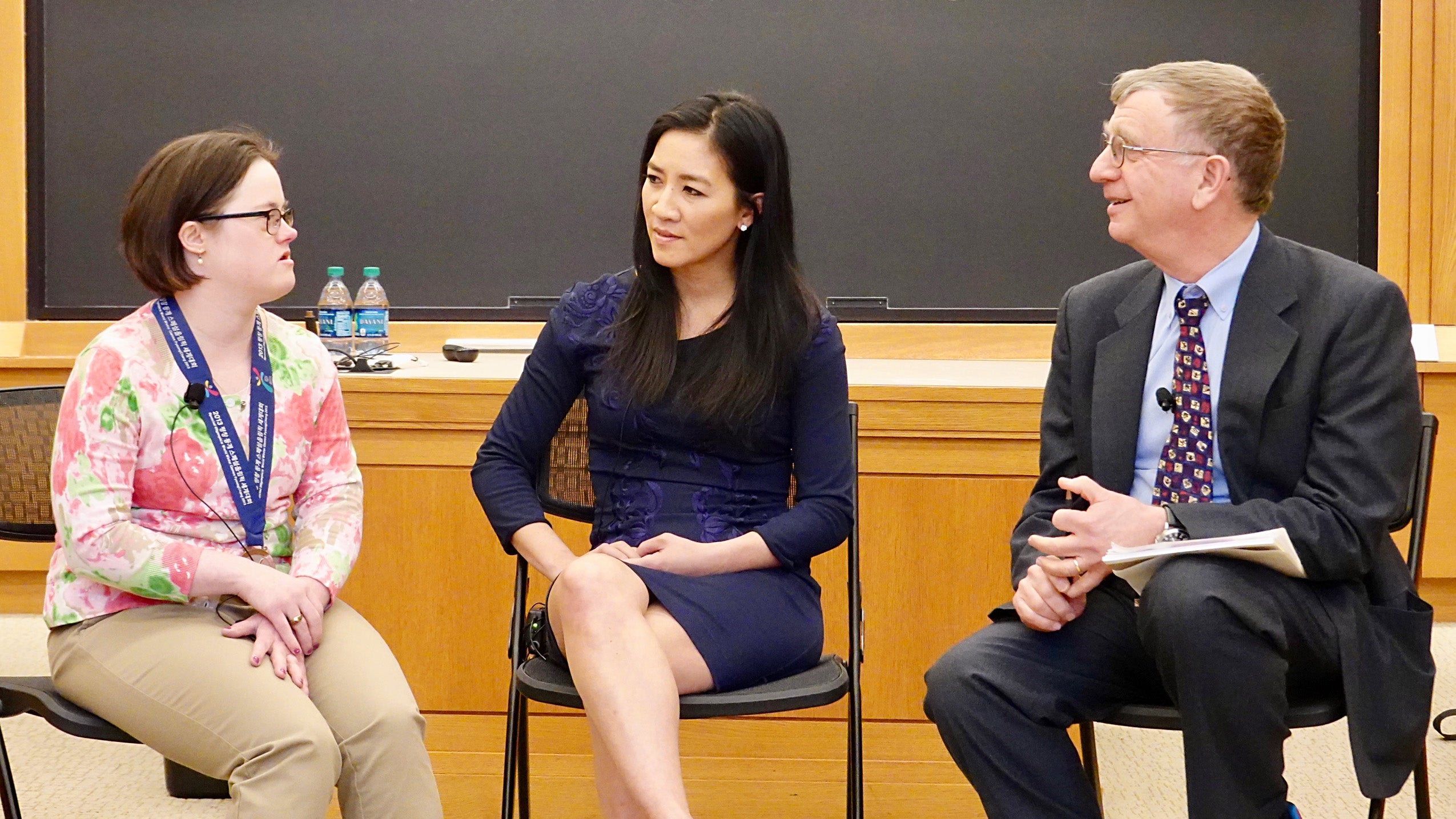Special Olympics — an international organization which provides sports training and athletic competitions for children and adults with intellectual disabilities — was founded in 1968; today, it serves more than six million athletes in almost 200 countries. To celebrate its 50th anniversary, the Harvard Law School Project on Disability (HPOD) recently presented a lively and inspiring conversation with Olympic medalist Michelle Kwan and Special Olympics medalist Melissa Joy Reilly, moderated by HLS Professor William Alford ’77.
“As an organization, Special Olympics is centered around sports, annually hosting more than 100,000 competitions in 32 Olympic sports around the world. But it is not exclusively about sports,” explained Alford, who is the director of East Asian Legal Studies, chairs HPOD, and serves on the board of Special Olympics International as lead director and chair of its Executive Committee. “Sports are wonderful for bringing people together, for creating healthy habits, for teamwork, and as a vehicle for expressing yourself, but Special Olympics also has several other types of programs.” Its Healthy Athletes initiative has provided free medical screenings, eyeglasses, hearing aids, and other services to more than two million Special Olympics athletes, while its Unified Schools program brings students with and without a disability to learn and play together, in 6,500 schools across the U.S. and a growing number abroad.
Pointing to his bright red and blue sneakers, “it’s not just that I’m a bad dresser,” Alford noted. At the recent Special Olympics World Games in Abu Dhabi, Pierce Footwear founder George Pierce donated 7,000 pairs of these specially designed shoes for participants. “I accepted a pair, but only after George and I agreed that I would buy two pairs for Special Olympics athletes unable to attend the Games,” Alford explained.
“I learn extraordinary lessons from our athletes — lessons of courage, determination, generosity, collegiality, and more,” he added. “With all the divisiveness in our country, and in many others, our athletes and volunteers bridge differences. Many times in our races, somebody falls, and other runners will stop and help that person up, in the spirit of collaboration.”
Alford has been involved with Special Olympics for decades, as have Visiting Professor Michael Ashley Stein ’88 and other HPOD personnel. China has been one particular focus of this work. Alford helped bring the 2007 World Summer Games to China and recently donated to Special Olympics China the $22,400 stipend that came with a major academic prize awarded to him by a leading Chinese academic society.
Reilly has been participating in Special Olympics since she was 10 years old; she became hooked on swimming and cycling first, then turned to alpine skiing, going on to win gold medals at the Special Olympics of Massachusetts Winter Games and silver medals in the slalom in the World Games in Nagano, Japan in 2005 and Pyeonchang, South Korea in 2013. “It was a real honor to represent Team USA over there,” she noted, remembering walking into the stadium through a military honor guard and the applause from everyone who was watching.
“I think that’s what the Olympics meant to me, how proud I was to be part of Team USA, like you were,” Kwan agreed, as she and Reilly talked like old friends even though they had just met. “I started dreaming of going to the Olympics when I was five years old. When I made it, it was the most emotional moment ever.” The most decorated figure skater in U.S. history, Kwan has won an unprecedented 43 championships, including two Olympic medals; today, she serves with Alford on the Special Olympics board of directors.
“There’s this energy, this joy, this passion and spirit for life that I learn from our athletes,” Kwan observed. In other situations, “sometimes they are made fun of, they get bullied, they get excluded, they’re never chosen for the team. And here they are, on this incredible platform, where they can do what they love.”
Alford asked Reilly about the greatest lesson she has learned from swimming and alpine skiing.
“It gives me confidence, to never give up, and to go for it,” Reilly answered.
“That’s it!” Kwan agreed. “Those are the key things you need to learn in sports. And falling. I fell so many times,” earning understanding nods from skaters in the audience.
Kwan shared stories about her skating career, noting that she didn’t always have new skates, fancy costumes, or even a coach, but her parents always supported and encouraged her. Both athletes also spoke about the transition from concentrating on athletics to the work they are doing now. “It’s not easy. To be honest, there was a sort of identity crisis, trying to find my own voice, a passion outside of something that I really loved,” Kwan admitted, joking that she needs to find a job where she can still walk into an arena and be greeted with applause. She completed undergraduate and graduate studies in international relations and political science, and was also appointed by then Secretary of State Condoleezza Rice as the first American public diplomacy envoy, a role which allowed her to travel to six countries to help foster understanding of American society and democratic principles. “It opened my world,” she added, leading to her new focus on public service and politics.
Reilly works in the Massachusetts State House as an aide to State Senator Jamie Eldridge. She has also been a Special Olympics global messenger and serves on its Massachusetts board of directors. “Special Olympics is an inspiration for people with intellectual disabilities,” Reilly observed. “It’s so meaningful for different athletes to go for their sport, to do something they like, and to go out there and reach their full potential.”
Summing up the spirit of Special Olympics, Reilly reminded the audience of the oath from ancient Greece that the athletes take before a competition: “Let me win. But if I cannot win, let me be brave in the attempt.”
